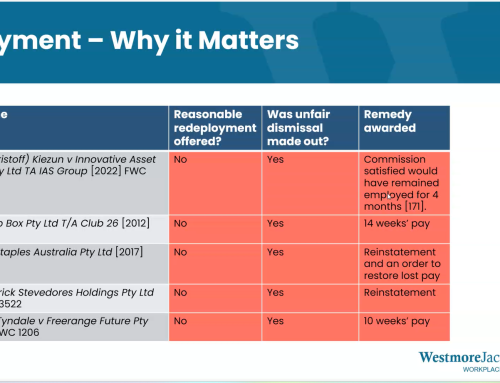
Introduction
The debate around working from home is heating up! Not even Jim Chalmers’ recent Economic Reform Roundtable could avoid getting sucked into the fight – overshadowing other more pressing issues to fixing Australia’s lagging productivity.
There is certainly no shortage of views about working from home (WFH).
The Allan Labor government has dipped its entire foot in the water. They propose to enshrine a 2-day per week WFH right for public and private employees in Victoria.
Jumping on the band wagon, the Greens say that the federal law should be amended to incorporate the proposals made by the Allan Labor government.
On the other end of the spectrum are business groups and some employers, who sometimes reflect the hardline views of some CEOs in the US such as John Stankey (CEO of AT&T). He says employees that value hybrid work should “find a job at another company.”
Caught in the crossfire is the Fair Work Commission (FWC). For over 12 months they have been trying to navigate a self-initiated review of the Clerks – Private Sector Award 2020 (Clerks Award) to include WFH provisions. There appears no immediate end in sight to this understandably complex undertaking.
Next is those who have taken issue with the FWC’s decisions to deny several employees’ WFH requests – calling for changes to the law to make it more difficult for employers to refuse such requests.
With so much happening, it’s easy to feel overwhelmed by the disorder.
Below we seek to cut through the noise and to explain what is actually happening. We start with the hardening views of employers about return to the office mandates before turning to the Allan Government’s proposal to enshrine WFH as a right.
Return to office mandates and shifting corporate culture
Return to office mandates are gaining traction for many Australian employers, with 39% of employers reportedly planning to require 5 days in the office in 2025.[1] Chief Executives at Westpac and ANZ Bank have also recently expressed their intentions to increase staff productivity and shake-up their current corporate culture. This appears to be following the lead of some large American corporations, such as JPMorgan Chase and AT&T, who have already taken decisive actions to drive employees back into the office.
Of course, any momentum for return to office mandates may be derailed by the Victorian government’s recent proposal.
Proposed changes by the Victorian government
The Allan Labor Government has proposed to establish the right to WFH for 2-days a week as an entitlement for public and private sector employees. How they will do so without a successful constitutional challenge is unclear and is the subject of some controversy.[2]
The Victorian Labor government says that WFH should not be something you “have to politely ask for,” but should instead be a “right you’ll be entitled to.” Here Labor is referring to section 65 of the Fair Work Act 2009 (Cth) (FW Act) which says only employees with particular characteristics are entitled to make flexible work requests.[3]
Employer groups have strongly opposed this proposal, arguing that it will create inequality amongst the broader Australian workforce and damage productivity.
Similar Proposal by the Greens in Senate
The Greens plan to take the Victorian proposal a step further by seeking to enshrine the right to WFH within the FW Act.[4] If successful, most employers across Australia would be required to “positively consider” a reasonable WFH request made by any employee.
It is important to note that the Greens currently hold significant influence in the Senate, with Labor often relying upon their support to pass legislation. Some iteration of their proposal to the FW Act may be a reasonable possibility.
Now, we turn towards the heated debate surrounding the FWC’s test case.
FWC’s Clerks Award test case
The FWC’s test case into inserting WFH provisions within the Clerks Award has employer and union groups at odds with each other.
Employer associations have argued that WFH arrangements should be subject to individual agreements between the parties.[5] This approach is necessary to avoid inadvertent Award compliance issues that are exacerbated when employees WFH.[6] For example, employees who are working outside of the ordinary span of hours due to their WFH arrangements should not also receive the benefit of penalty rates, when this work could have been completed at the office during ordinary hours. Further, if the Federal Parliament approves the proposal to protect award penalty and overtime rates,[7] such WFH arrangements could be very costly for employers.
In contrast, unions have pushed for employees to have a right to request WFH arrangements. The CPSU has gone as far as to demand that the Clerks Award should require employers to apply a bias in favour of approving WFH requests – similar to many Australian Public Service Enterprise Agreements. The ASU has also demanded that employers provide a 6-month notice prior to enforcing any return to office mandates.
The FWC’s test case is far from over, and it will presumably influence how future WFH provisions will be written in many modern awards. The outcome of this test case (and subsequent changes in other awards) has the potential to turn WFH arrangements into a key bargaining chip during future enterprise bargaining discussions.
Flexible working arrangements under section 65
Section 65 of the FW Act only entitles employees with a particular characteristic (such as a disability or carer’s responsibilities) to request flexible working arrangements. The case law suggests that the applicability to such characteristics is being strictly applied by the FWC – which to date has often been unfavourable for employees.
In a recent decision, a parent’s preference to continue with a “pre-existing pattern of remote work” failed to establish the required nexus with his responsibilities as a parent.[8] The employee failed to demonstrate that working from home was more than a “mere preference,” as he had no specific caring duties during his ordinary working hours.
In another case, a WFH flexibility request was denied by the FWC due to insufficient medical evidence, which failed to establish a nexus between an alleged disability and the employee’s apprehension with commuting to the city.[9]
The cases broadly suggest it is onerous, but not impossible, for employees to prove the requisite connection between their characteristic and the flexibility requested, such as WFH. If the proposed legislative changes discussed above are adopted, employers may soon face a positive obligation to consider all WFH requests, irrespective of the nature of the employees’ circumstances.
Conclusion
The debate around working from home is far from settled and will undoubtedly continue to evolve. With the current political climate leaning toward stronger WFH rights, we believe it’s not a question of if, but when employees will gain greater ‘rights’ to work remotely.
Adam Colquhoun (Principal) and Baldeep Singh (Law Clerk)
This article is general information only. It is not legal advice. If you need legal advice, please contact us.
Citations:
[1] https://www.roberthalf.com/au/en/about/press/more-employers-mandate-5-days-as-they-follow-other-businesses
[2] The proposal by the Victorian government may be inconsistent with the FW Act, which overrides certain State laws. This would open the possibilities of a constitutional challenge.
[3] These requests can be subsequently denied by employers on the basis of reasonable business grounds.
[4] Such an amendment to the FW Act may quash any inconsistencies between the Victorian proposal and the FW Act – limiting the chances of a successful constitutional challenge.
[5] This would be enacted through the use of various facilitative clauses within the Clerks Award.
[6] Many employers believe that they no longer exercise significant autonomy or control over the content of the work performed, and when it is performed by their employees. This limits their ability to ensure award compliance with the spread of hours and appropriate pay rates.
[7]Fair Work Amendment (Protecting Penalty and Overtime Rates) Bill 2025 (Cth).
[8] Paul Collins v Intersystems Australia Pty Ltd [2025] FWC 1976 at [40-41].
[9] Andrew Sampsonidis v Make It Mine Finance Pty Ltd [2025] FWC 1330 at [11].





